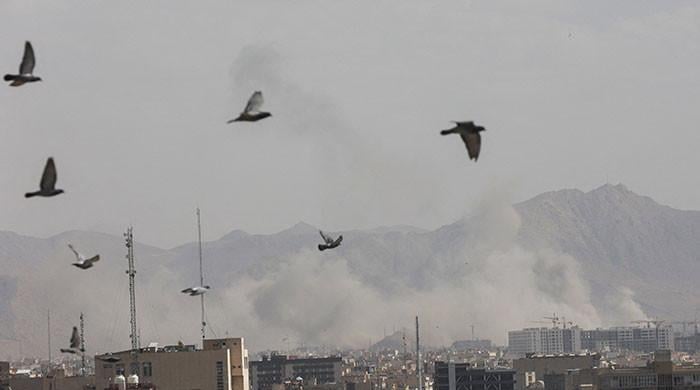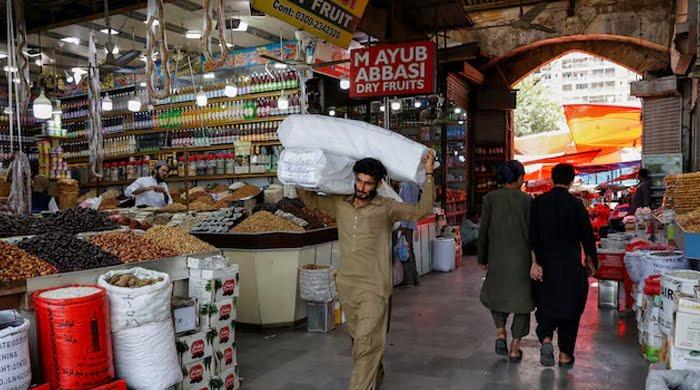Pakistan at 100 and the Generation Z
Whatever solutions Pakistan devises now will come from the only living generation that should have any real agency in Pakistan at 100
July 14, 2022

The median age in Pakistan is just a shade under 23. What an amazing data point with which one may ponder the future of Pakistan! Younger Pakistanis may not be as susceptible to this kind of optimism, but the swiftness with which generational change takes place is surely easier for the elderly than the median-aged Pakistani to see. In recent years, these generational changes have mostly been a source of disquiet and trepidation. Is there any silver lining at all?
Many among Generation X in Pakistan (this writer included) have spent the last two (some even three) decades advocating for ‘process’. Trust the process. Stop intervening in democratic governance and the fruits of a stronger, more secure, more stable society will emerge. Since 2008, this process has been hacked; we now have a triple threat of Pakistani regime manipulation set-pieces – one got Yusuf Raza Gilani, another got Nawaz Sharif, and yet another got Imran Khan. These sleight-of-hand interventions in the process have allowed for the facade of civilian leadership as the military continues to wield enormous and unaccountable power over the entire political system.
Pakistani Gen X democrats have been left in the lurch. In our left hands, we hold the smelly diaper of an enfant terrible democracy that keeps manufacturing flawed man-child leaders like Imran Khan and recycling dynasts from the Sharif and Bhutto-Zardari clans. In our right hands, we hold prayer beads for the martyrs of Pakistani soldiers that have fought (and are fighting) an existential war for the survival of the Pakistani republic. How are we supposed to frame a robust critique of military interventions in civilian affairs whilst still acknowledging and valuing our soldiers?
For many young Baloch activists, tired of living poor in a rich province, this isn’t exactly Sophie’s choice. Many young Pakhtuns are tired of being treated as second-class citizens at check posts around the country, and across the mainstream media landscape. In voicing anger at a system that excludes and neglects them, young discontents are under no obligation to behave as we would like them to. Alignment with the national security state is much more palatable to those Pakistanis that are net beneficiaries of the security the state provides than those that have suffered through the country’s wars. This is why Pakistanis in urban areas, and Pakistanis above a certain threshold in terms of consumption and income are much more receptive to the military’s version of the Pakistan national story. An urban and middle class Pakistan is both the self-fulfilling fantasy of the Pakistani establishment and its primary audience in terms of nation-building. In this constellation of assumptions and aspirations, the Sharifs and the Bhutto-Zardaris are plausible but unexciting candidates to lead Pakistan in the run-up to the 100 year anniversary of the country’s founding.
As early as 2011, the Pakistani establishment proactively engaged in the political alchemy that fuelled Imran Khan’s eventual ascension to the office of the prime minister. There were two assumptions that drove excitement about an Imran Khan-led Pakistan amongst the most powerful quarters in the country. The first was that a so-called "clean" politician would be able to excite the urban and middle class Pakistan that the Pakistani establishment both comes from and feels somewhat accountable to. The second was that, with enough support from the spectrum of national power (judicial, media, electables), Khan was guaranteed to be a high-performance prime minister. In short, whatever violations of process and shortcuts needed to be taken, could be, because all would be forgotten once the country enjoyed the taste of a popular, competent, elected leader that was able to deliver the thing that Pakistan needed the most in 2016: a stable and growing country. Oopsy daisy.
The premise of the Imran Khan gamble was that the ‘process’ was simply incapable of delivering anything more than the House of Nawaz. Or alternatively, a PPP-led Zardaridom. Each version of ‘process’ that advocates of democracy, federalism, and civilian supremacy can point to has had some strengths – and the degree to which anyone will admit those strengths is largely a game of subjective likes and dislikes. On the whole, the anti-democrats are absolutely right about the one thing that they hinge their entire mantra on: the democratic, federal, civilian-led order produces slow, and inefficient mechanisms to deliver flawed, sometimes even ugly outcomes.
Since public discourse is mostly a beauty pageant of truisms delivered eloquently, this critique of democracy and the 1973 constitution-led federal order is often celebrated. Many breaths are taken away, many oohs and aahs elicited at repeated expressions of such glad-handled knowns. But just like any poetic sequence, the tragicomedy that is governance in Pakistan has an ayang for this yin. If the process doesn’t work, then surely the interventions in this process should have. How have the interventions fared?
In 2008, the process delivered the Yusuf Raza Gilani prime ministership. In 2012, an intervention ended it. But the compact between the President’s House and General Ashfaq Parvez Kayani did not skip a beat. Enter 2013, and the process delivered a third Nawaz Sharif prime ministership. The process doesn’t seem to learn its lessons. But neither do interventions. The 2017 intervention that took Sharif out was less illegal than the 1993 version of that movie, and was certainly more defensible than the 1999 sequel that debilitated the country and its global standing to this day. But the wider system of governance, key issues in national security policy, key foreign policy issues, and even wider economic policy didn’t stray very far from whatever preceded the intervention.
An honest gathering that includes Dr Miftah Ismail, Dr Abdul Hafeez Shaikh, and Shaukat Tarin would be hard pressed to offer the fundamental differences between what they deem necessary and good for the economy (I exclude Dar Saahib and Asad Umar only to avoid the tedium of vacuous protestations about their distinctive qualities). Why is this the case? It is largely because most finance ministers are the public policy version of Pakistan’s emergency responders: they are firemen. It turns out, as even the most generous reading of history informs us: interventions make bad processes worse, and their contradictions become deeply held institutional convictions, – paralysing genuine efforts for reform.
In an age where even the most enlightened and sharpest minds are drawn to binary to describe others and, more damagingly, themselves, the last paragraph in this journey seems to be a roundabout with no cops manning it: process, intervention, process, intervention, ad infinitum, ad nauseam. The only constants are the outcomes. Pakistan ranks poorly on almost every measure of the well-being of its people. The people are stuck on the roundabout – there is no escape in sight.
But this feeling of being stuck and trapped is, I would argue, a generational condition, and not a fact of physics, or any kind of science at all. Generation X had two great moments of hope – though most of us only indulged in one or the other of those.
The 1999 intervention was going to fix everything: a self-confident, middle class man of the people that wasn’t shy about owning a dog? Many urban, middle-class Pakistanis, exhausted by the democracy of the 1990s, were giddy about the possibilities the Musharraf era offered.
The 2006-2008 meltdown of the Musharraf regime and the so-called consensus for stability and growth that it was built upon gave way to the first version of the PDM coalition in power today: an amalgam of democrats stitched together in the cold, wet ‘outside’ (London) that the PML-N and PPP were forced to endure by Musharraf. But unlike this version of the democratic consensus, the 2008 version had a genuine political moment driving it – the unlikely hero being a deeply flawed chief justice who decided he wouldn’t be cowed by phone calls or meetings from Rawalpindi, and who rejected pressure, both implicit and explicit.
Generation X has produced and consumed every iteration of every version of governance that possibly exists and, outside of personal likes and dislikes, has arrived at the ‘none of the above’ box. But in keeping with our generation’s most defining attribute, Gen X also has no actual solution (neither do our younger siblings and friends, the Millennials).
Gen X and millennials just know that the existing menu has nothing on it worth getting excited about. Whatever solutions Pakistan devises now will come from the only living generation that should have any real agency in Pakistan at 100: Generation Z.
The writer is an analyst and commentator.











